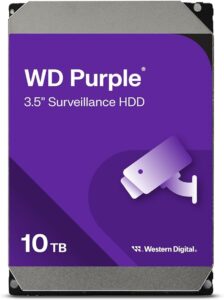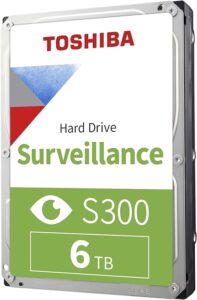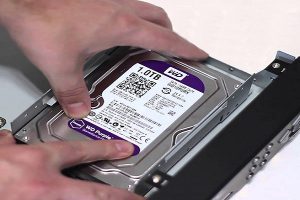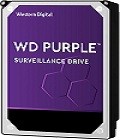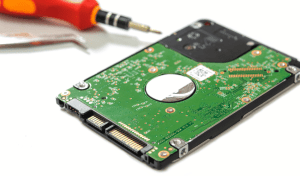When it comes to security DVR systems, having a reliable hard drive is just as important as the cameras themselves. A quality hard drive ensures continuous, high-capacity video recording, long-term data storage, and dependable playback—all essential for surveillance operations.
In this guide, we’ll explore the top-rated hard drives designed specifically for DVR security systems, along with what features to look for before buying.
What Is a Hard Drive For Security DVR?
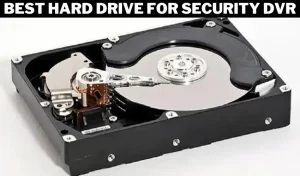
A security DVR hard drive is a storage device designed specifically for digital video recorders (DVRs) used in surveillance systems.
Unlike regular desktop hard drives, these are built for continuous 24/7 operation, handling constant read/write workloads from multiple video feeds.
Why You Need a Specialized Hard Drive
Constant Operation
Surveillance systems run non-stop. Standard desktop drives aren’t built to handle continuous writing, which can lead to overheating and premature failure.
Higher Workload Rating
Security drives can handle a higher volume of data, often rated for 180TB/year or more, compared to 55TB/year on desktop drives.
Video-Optimized Performance
These drives feature technologies like AllFrame (WD) or ImagePerfect (Seagate), which reduce frame loss and improve playback quality.
Best Hard Drive For Security DVR Reviews
1. Western Digital Purple Surveillance Hard Drive
- Capacity Options: 1TB–14TB
- Why It’s Great:
- Engineered specifically for 24/7 surveillance systems
- Supports up to 64 HD cameras
- AllFrame technology reduces frame loss and improves playback
- Low power consumption for cool, quiet operation
- Best For: Residential and commercial security systems
The WD Purple 10TB Surveillance Hard Drive (WD102PURZ) is purpose-built for 24/7 video recording, making it one of the most reliable storage options for DVR security systems. With support for up to 64 HD cameras and AllFrame technology, it minimizes video interruptions and maximizes data integrity during continuous recording.
We praise its long-term reliability, with flawless performance even after several years of use. The plug-and-play setup and large capacity make it ideal for high-demand surveillance systems. Backed by a 3-year limited warranty, this drive is an excellent choice for anyone needing dependable, high-capacity storage for always-on security monitoring.
2. Seagate SkyHawk Surveillance Internal HDD
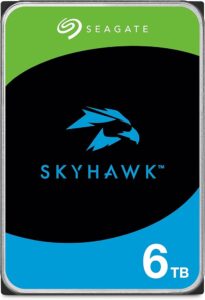
- Capacity Options: 1TB–16TB
- Why It’s Great:
- Built for high-write workloads and continuous use
- ImagePerfect firmware optimizes performance and reliability
- Supports up to 64 cameras
- Includes Rescue Data Recovery Services (on select models)
- Best For: High-capacity, heavy-duty DVR systems
 Frequently Asked Questions
Frequently Asked Questions
1. Can I use a regular desktop hard drive in my security DVR?
Answer: Technically, yes—but it’s not recommended. Desktop hard drives are not designed for the constant 24/7 writing workload of a DVR. Using one can lead to overheating, failure, or dropped frames in your recordings. Always use a surveillance-grade hard drive designed for continuous video recording.
2. How much storage do I need for my DVR system?
Answer: This depends on the number of cameras, video resolution, and how long you want to store footage. Here’s a rough guide:
-
1TB: ~7–10 days for 4 cameras at 1080p
-
2TB–4TB: ~2–4 weeks for 4–8 cameras
-
6TB+: Over a month for large systems with 8–16+ cameras
Compression settings (H.264/H.265) and motion detection can greatly extend storage time.
3. What is the difference between NVR and DVR hard drives?
Answer: Functionally, the hard drives used in DVRs (Digital Video Recorders) and NVRs (Network Video Recorders) are the same—both are typically 3.5″ SATA surveillance hard drives. The main difference is the system they’re used in: DVRs use analog or coaxial connections, while NVRs handle IP cameras via a network. Either way, choose a drive labeled for surveillance use.
4. Do I need to format a new hard drive before installing it in my DVR?
Answer: In most cases, no. Modern DVRs automatically detect and format the new hard drive once installed. However, it’s important to check your DVR manual—some models may require you to format the drive manually from within the DVR’s settings menu.
5. What are RV sensors, and do I need them?
Answer: RV (Rotational Vibration) sensors help maintain performance in environments with multiple hard drives or heavy vibration. If your DVR system uses more than one drive, RV sensors are highly recommended to prevent performance issues and data loss. Drives like the Seagate SkyHawk and Toshiba S300 often include RV sensors in 4TB+ models.
Bottom Line
Choosing the right hard drive for your security DVR isn’t just about capacity—it’s about reliability, durability, and performance. A surveillance-grade HDD ensures your video footage is recorded without interruption, protected from corruption, and easy to retrieve.
By investing in a quality drive like the WD Purple, Seagate SkyHawk, or Toshiba S300, you’re ensuring your surveillance system is backed by reliable storage you can trust.
Related Resources:
- Best Solar Powered Security Camera Reviews
- Light Bulb Security Camera Reviews and Buying Guide
- How to install security cameras in your home
- Which type of camera is best for home security
- How Much Data Do Security Cameras Use Monthly?
- Can I Install Security Cameras Myself?

